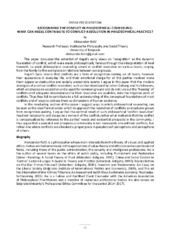Prikaz osnovnih podataka o dokumentu
Recognising the conflict in philosophical counseling : What can Hegel contribute to conflict-resolution in philosophical practice?
| dc.contributor.editor | Fatić, Aleksandar | |
| dc.creator | Fatić, Aleksandar | |
| dc.date.accessioned | 2017-11-01T10:15:36Z | |
| dc.date.available | 2017-11-01T10:15:36Z | |
| dc.date.issued | 2014 | |
| dc.identifier | 978-86-82417-71-2 | |
| dc.identifier.uri | http://rifdt.instifdt.bg.ac.rs/123456789/342 | |
| dc.description.abstract | The paper discusses the potential of Hegel’s early views on ‘recognition’ as the dynamic foundation of conflict, which were made philosophically famous through the interpretation of Axel Honneth, to assist philosophical counselling aimed at conflict resolution on various levels, ranging from the family to the workplace or relations between social groups. Hegel’s basic idea is that conflicts are a form of recognition-seeking on all levels; however their appearance in everyday life, and their emotional charge for all the parties involved make them appear as destructive and socially undesirable events. I argue in this paper that the modern strategies of practical conflict-resolution, such as that developed by Johan Galtung and his followers, which emphasise de-escalation and a quest for common ground and do not rule out the ‘freezing’ of conflicts until adequate circumstances for their resolution are available, miss the Hegelian point of conflicts. Thus they fail to contribute to a full understanding of the conceptual foundations of most conflicts and of ways to address them as dimensions of human existence. In the concluding section of the paper I suggest ways in which philosophical counselling can be seen as the ideal format under which to approach the resolution of conflicts as structures grown from recognition-seeking. I argue that the optimal result of such philosophical ‘conflict resolution’ need not necessarily and always be a removal of the conflict; rather what matters is that the conflict is conceptualized by reference to the parties’ needs and existential prospects in the community. I thus argue that a peaceful and prosperous community is not necessarily one without conflicts, but rather one where conflicts are allocated a proper place in people’s self-perceptions and perceptions of others. | eng |
| dc.format | (2014) 35- | |
| dc.language | en | |
| dc.publisher | Beograd : Institut za filozofiju i društvenu teoriju | |
| dc.rights.uri | https://creativecommons.org/licenses/by-nc-nd/4.0/ | |
| dc.source | Book of Abstracts: 13th International Conference on Philosophical Practice: Philosophical Practice as a Profession and a New Paradigm in Philosophy | eng |
| dc.title | Recognising the conflict in philosophical counseling : What can Hegel contribute to conflict-resolution in philosophical practice? | eng |
| dc.type | article | |
| dc.rights.license | BY-NC-ND | |
| dcterms.abstract | Фатић, Александар; Фатић, Александар | |
| dc.citation.spage | 35 | |
| dc.type.version | publishedVersion | |
| dc.identifier.fulltext | http://rifdt.instifdt.bg.ac.rs/bitstream/id/11878/bitstream_11878.pdf | |
| dc.identifier.rcub | https://hdl.handle.net/21.15107/rcub_rifdt_342 |

